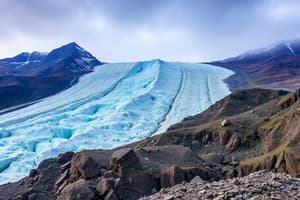Podcast
Questions and Answers
Co oznacza zdarzenie wiosennej Grenlandii?
Co oznacza zdarzenie wiosennej Grenlandii?
- Okres spadku poziomu mórz na wyspie Grenlandia.
- Okres suszy, który ma miejsce na Grenlandii wiosną.
- Okres szybkiego wzrostu temperatury na wyspie w przejściu zimy na lato. (correct)
- Okres obniżenia temperatury na Grenlandii wiosną.
Jakie są główne przyczyny zjawiska wiosennej Grenlandii?
Jakie są główne przyczyny zjawiska wiosennej Grenlandii?
- Zmiany w cyrkulacji atmosferycznej i prądach oceanicznych spowodowane działalnością ludzką. (correct)
- Zanieczyszczenie powietrza przez pyły mineralne.
- Wulkaniczne erupcje na Grenlandii.
- Wahania sezonowe bez wpływu ludzkiej działalności.
Jaki wpływ ma wzrost temperatur podczas zdarzenia wiosennej Grenlandii na poziom mórz globalnie?
Jaki wpływ ma wzrost temperatur podczas zdarzenia wiosennej Grenlandii na poziom mórz globalnie?
- Prowadzi do topnienia lodowców, co z kolei wpływa na poziom mórz globalnie. (correct)
- Nie ma wpływu na poziom mórz globalnie.
- Powoduje obniżenie poziomu mórz globalnie.
- Powoduje wzrost poziomu mórz globalnie ze względu na intensywne opady deszczu.
Jakie konsekwencje dla lokalnych ekosystemów niesie topnienie lodowców podczas zdarzenia wiosennej Grenlandii?
Jakie konsekwencje dla lokalnych ekosystemów niesie topnienie lodowców podczas zdarzenia wiosennej Grenlandii?
Z jakich źródeł utrzymanie się wielu mieszkańców Grenlandii zależy?
Z jakich źródeł utrzymanie się wielu mieszkańców Grenlandii zależy?
Który czynnik powoduje dalsze nasilenie procesu ocieplania podczas zdarzenia wiosennej Grenlandii?
Który czynnik powoduje dalsze nasilenie procesu ocieplania podczas zdarzenia wiosennej Grenlandii?
Dlaczego wiosna grenlandzka w 2011 r. była uważana za wyjątkową?
Dlaczego wiosna grenlandzka w 2011 r. była uważana za wyjątkową?
Jaka jest główna rola wydarzenia wiosny grenlandzkiej 2011 r.?
Jaka jest główna rola wydarzenia wiosny grenlandzkiej 2011 r.?
Jakie mogły być skutki ocieplenia klimatu dla Grenlandii, jak opisano w tekście?
Jakie mogły być skutki ocieplenia klimatu dla Grenlandii, jak opisano w tekście?
Co stwierdzono w kontekście wydarzenia wiosny grenlandzkiej 2011 r.?
Co stwierdzono w kontekście wydarzenia wiosny grenlandzkiej 2011 r.?
Jakie konsekwencje mogą wynikać ze wzrostu dostępności dróg wodnych przez topnienie lodu?
Jakie konsekwencje mogą wynikać ze wzrostu dostępności dróg wodnych przez topnienie lodu?
Jaka jest istotność wydarzenia wiosny grenlandzkiej dla zmieniającego się klimatu Ziemi?
Jaka jest istotność wydarzenia wiosny grenlandzkiej dla zmieniającego się klimatu Ziemi?
Study Notes
Greenlandic Spring Event
Significance
The Greenlandic spring event is a significant occurrence in Greenland's climate history. It marks a period of rapid temperature increase across the island during its transition from winter to summer. This shift in weather patterns has considerable implications for local communities, wildlife, ecosystems, and even global climate change discussions.
Causes
The primary cause of this phenomenon is attributed to changes in atmospheric circulation and ocean currents due to human activities such as greenhouse gas emissions. These alterations in natural processes lead to more frequent warming events that can have severe consequences on the environment. Additionally, ice melt and other environmental factors contribute to the warming trend observed in Greenland over recent decades.
Impact on Greenland
The sudden rise in temperatures during the Greenlandic spring event has led to melting glaciers, which in turn impacts sea levels globally. Melting ice sheets also affect local ecosystems by disrupting habitats and food chains, leading to potential species extinctions. Furthermore, the increased exposure of darker surfaces under melting ice increases the absorption of solar radiation, further exacerbating the warming process.
Greenlandic Commune
Local communities in Greenland face numerous challenges due to these climate changes. Many inhabitants rely heavily on hunting, fishing, and traditional craftsmanship for their livelihoods. As the ice melts and waterways become more accessible, some might see opportunities for economic growth. However, this could come at the cost of disruption to hunting grounds and traditional ways of life.
Greenlandic Spring 2011
In particular, the Greenlandic spring 2011 stands out as one of the most notable instances of this warming pattern. During this time, temperatures rose rapidly, causing widespread concerns among scientists and policymakers alike. This event was considered exceptional because it occurred earlier than expected based on historical records and climate models.
In conclusion, the Greenlandic spring event represents a crucial part of our understanding of Earth's changing climate. Its significance lies not only in the immediate effects on Greenland but also in its role as a warning signal for future changes around the globe. As we grapple with the realities of anthropogenic climate change, events like the Greenlandic spring serve as stark reminders of what may lie ahead if we do not act swiftly and decisively.
Studying That Suits You
Use AI to generate personalized quizzes and flashcards to suit your learning preferences.
Description
Explore the significance, causes, impacts on Greenland, and implications for local communities of the Greenlandic spring event. Learn about the 2011 event and its implications for global climate change discussions.





